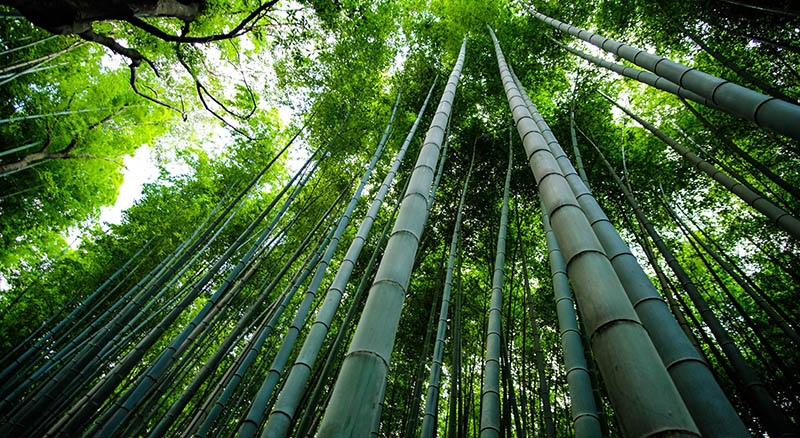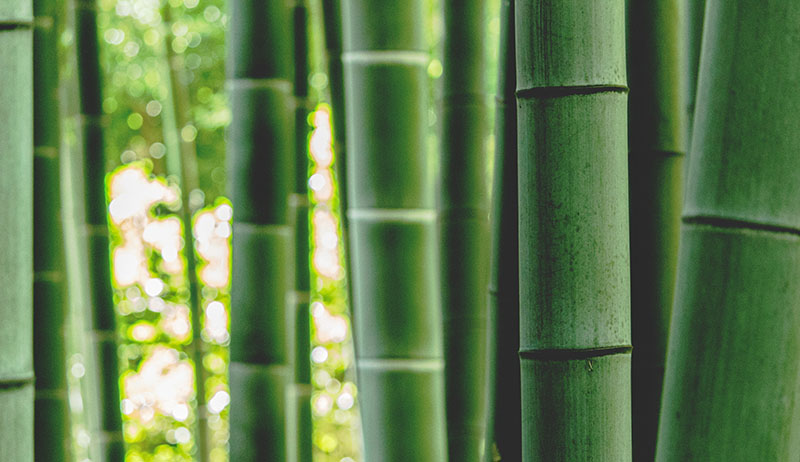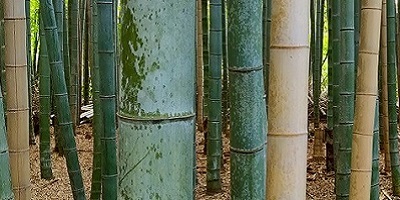In this guide, we will explore:
- What is bamboo packaging?
- How are bamboo food packaging products made?
- What are the benefits of bamboo packaging products?
- What are the other uses of bamboo?
- Are bamboo food packaging products right for my business?
What is bamboo packaging?
Bamboo packaging is made from the bamboo plant. Contrary to popular belief, bamboo plants aren’t trees. They’re actually a member of the grass family. There are over 1,000 different species of bamboo that grow in various parts of the world but mainly Asia.
Bamboo is one of the fastest growing plants in the world. Like trees, bamboo is renewable but grows much faster than hardwood. One species can grow up to 35 inches in one day! It can reach maturity and be harvested in 3–5 years.
Bamboo requires less water compared to many other crops and can thrive without the need for pesticides, fertilizers, or replanting making its cultivation more environmentally friendly. What's more, bamboo forests absorb more carbon dioxide and release more oxygen than an equivalent stand of trees, making them excellent for improving air quality and combating climate change.
Clearly, bamboo is a pretty extraordinary plant. But, how does the plant transform into bamboo utensils, bamboo tableware, bamboo catering supplies, or any other bamboo food packaging product?

How are bamboo food packaging products made?
There are different ways to transform material bamboo into sustainable packaging solutions. They vary if you’re creating disposable tableware or reusable products.
Let’s look at both of the processes.
Making disposable bamboo tableware:
Most disposable bamboo packaging like bamboo plates and cones are made from a part of the plant known as the sheath. This is the outer layer of the bamboo’s stem that falls off when the plant reaches a certain age.
1) This sheath is collected right after it hits the ground.
2) After the sheath is collected, it is cleaned, boiled and then laminated. Lamination is the process of binding the bamboo together in layers, not coating and lining the bamboo.
3) Finally, once it’s laminated, it’s pressed into the desired bamboo tableware shape.
Although these products are made to be disposable, they can often be reused several times. Some are even dishwasher safe.
Making durable or reusable bamboo products:
Bamboo utensils for serving, are made with a different process. The part of the plant that’s used is also different. Rather than just the discarded sheath, this type of product requires the whole plant.
1) Once a bamboo plant reaches maturity and is ready to harvest, it’s taken in for grinding. The bamboo plant is ground up into a fine powder.
2) Using a patented process, manufacturers can mold this powder into virtually any product or shape.
3) The end result is a durable, biodegradable, and toxin-free bamboo product that can be reused again and again.

What are the benefits of bamboo products?
It’s well known that petroleum-based disposables like plastic packaging pose a variety of environmental and health issues. For example, Polystyrene foam cups release more than 50 chemical byproducts during the manufacturing process. The most serious of which is styrene, which is considered to be a possible human carcinogen.
Paper products, despite their renewability, are also not perfect. It takes regular timber 30–50 years to be mature enough to harvest. Despite this, around 40% of the world’s wood is harvested for commercial use. This contributes to social conflict, habitat loss, greenhouse gas emissions and water pollution.
While recycled paper packaging products are increasingly common, they still require trees. Bamboo packaging presents a renewable and eco-friendly alternative to paper, plastic, and everything in between.
The environmental benefits of bamboo:
- Renewable – Bamboo grows rapidly. It’s an abundant renewable resource, making it an ideal, eco-friendly alternative to traditional paper products.
- Biodegradable & Compostable – Bamboo is biodegradable and 100% compostable within 2–6 months, depending on the specific product and composting conditions.
- Carbon footprint – Bamboo releases 35% more oxygen into the atmosphere than the same volume of trees. By supporting the bamboo market, you’re supporting the continued carbon emission reduction caused by bamboo plants.
The food packaging benefits of bamboo:
- Strength - Bamboo has a greater tensile strength than steel.
- Appearance - Bamboo utensils and bamboo catering supplies look natural and elegant.
- Eco-friendly Profile - No bleach or added toxins are needed or required
Durable, elegant, and environmentally friendly: bamboo packaging checks all the boxes.

What are the other uses of bamboo?
Bamboo is being utilized in a wide variety of industries and products across the globe:
- Construction industry (houses, bridges, buildings, schools)
- Flooring
- Fabric and textiles (clothing and rugs)
- Accessories (jewelry, shoes, purses)
- Scaffolding (In Hong Kong, builders prefer bamboo scaffolding to metal scaffolding.)
- Furniture (couches, dressers, tables)
- Paper products
- Instruments
- Personal care products (toothbrushes, hairbrushes, natural cosmetic products, toilet paper)
- And many more
Bamboo has become a staple material in the modern, eco-conscious world. It has already exploded in Asian and Indian markets, and it’s rapidly making its way into Western markets, too.
It’s easy to see why bamboo has become such a sought-after material. Bamboo’s environmental benefits alone make it worthy of consideration.
Are bamboo food packaging products right for my business?
If your business uses any of the products below, you should consider trying bamboo. Bamboo food packaging options provide an elegant, durable, renewable, and fully compostable alternative to paper and plastic products.
- Utensils (biodegradable bamboo utensils)
- Bamboo tableware
- Bowls
- Plates
- Boats
- Cones
- Cups
- Skewers & picks
- Bamboo catering supplies
At Good Start Packaging, we’re passionate about providing high-quality bamboo food packaging products at a cost you can afford. Contact us to learn more about how our bamboo tableware and packaging can help you reach your sustainability goals.



